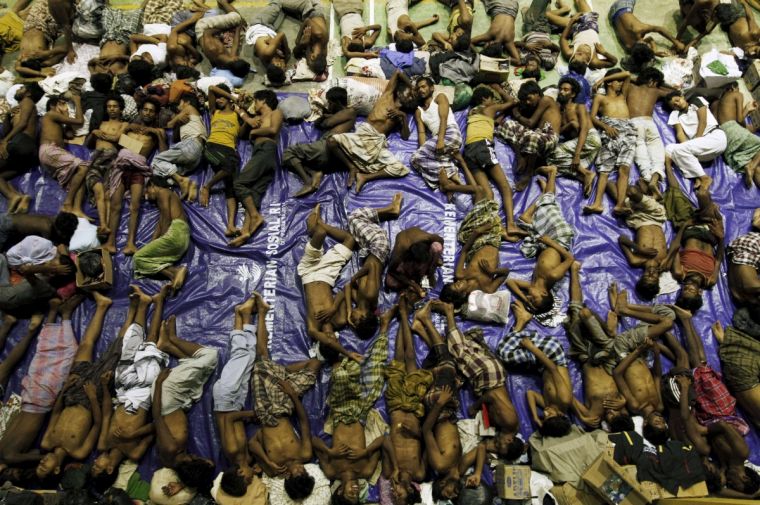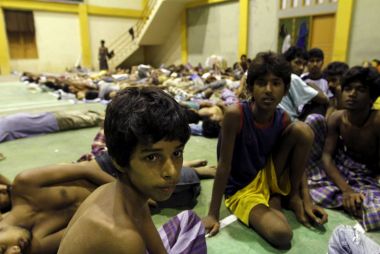People smuggling is on the rise in Bangladesh and Myanmar

Malaysia detained more than 1,000 Bangladeshi and Rohingya refugees, including dozens of children, police said, a day after authorities rescued hundreds stranded off the coast of Indonesia's western tip.
There has been a huge increase in refugees from impoverished Bangladesh and Myanmar drifting on boats to Malaysia and Indonesia in recent days after Thailand, usually the initial destination in the region's people smuggling network, announced a crackdown on the trafficking.
More than 100 refugees from these countries were found wandering around in southern Thailand last week, apparently after they were abandoned by the smugglers.
An estimated 25,000 Rohingya Muslims from Myanmar and Bangladeshis boarded people smugglers' boats in the first three months of this year, twice as many in the same period of 2014, the UN refugee agency UNHCR has said. Most travel in rickety traffickers' boats to Thailand, where they are held in squalid jungle camps until a ransom is paid.
Police on the northwest Malaysian island of Langkawi, close to the border with Thailand, said three boats arrived in the middle of the night to unload the refugees, who were taken into custody as they came ashore. One boat was discovered after it got stuck on a breakwater, but the other two vessels escaped. There was no immediate word on the crew.
"They came from their respective countries, moved towards Thailand and into Malaysia by Langkawi," local police chief Harrith Kam Abdullah told Reuters. He did not elaborate.
The boats contained 555 Bangladeshis and 463 Rohingya, who would be handed over to the immigration department, he added.
Malaysia, one of Southeast Asia's wealthier economies, has long been a magnet for illegal immigrants from poorer countries in the region.
Nearly 600 migrants thought to be Rohingya refugees and Bangladeshis were rescued from at least two wooden boats stranded off the coast of Indonesia's Aceh province on Sunday, authorities said.
The overcrowded boats, which were carrying nearly 100 women and dozens of children among the refugees, were towed to shore by fishermen after running out of fuel.
Thai police spokesman Lieutenant General Prawut Thawornsiri said the crackdown in people smuggling had prompted the rush of arrivals elsewhere.
"Yes, our crackdown is affecting the boats," he told Reuters in Bangkok. "They are going to Indonesia. Why else would they go to Indonesia? It is so far. ...Our job is to block the boats and not let them land on our shores."
MASS GRAVES
Thai Prime Minister Prayuth Chan-ocha ordered a clean up of suspected human trafficking camps around the country after 33 bodies, believed to be of migrants from Myanmar and Bangladesh, were found in shallow graves in the south of the country, near Malaysia.
First Admiral Maritime Zulkifli bin Abu Bakar, the head of criminal investigations in the Malaysian Maritime Enforcement Agency, said the arrivals in Malaysia were a surprise and couldn't say if they were linked to the Thai crackdown.
"We didn't expect large numbers like this to come down," he said.
Of those rescued off Indonesia, around 50 were taken to hospital. "In general, they were suffering from starvation and many were very thin," said North Aceh policechief Achmadi.
Some of the migrants had initially believed they had arrived in Malaysia.
The refugees were being held in a gymnasium in the town of Lhoksukon, about 20 km (12 miles) from where they were brought ashore.
Mohammad Kasim, a Bangladeshi migrant on one of the boats, told Reuters that each passenger paid 4,400 ringgit ($1,200) for the journey to what they thought would be Malaysia. Three people died on the journey and were dumped in the sea, he said.
"We are hearing the passengers were left close to shore and were told that this is Malaysia and you got what you paid for. They came onshore and found out it wasn't Malaysia," said Mark Getchell, head of the International Organization for Migration in Indonesia.

An agency official estimated that around 300 people had died at sea in the first quarter of this year as a result of starvation, dehydration and abuse by boat crews.
Kasim, 44, said he had left the Bangladesh town of Bogra a month ago on a small boat with 30-40 other people in the hope of finding a job in Malaysia. An agency in Bogra helped arrange the trip.
"Before, I worked in Malaysia for three years in construction when I was 16. I wanted to go back because it is very difficult to find work in Bangladesh," Kasim, speaking in Malay, told Reuters.
After leaving Bogra, they arrived at a Thai beach where he said they stayed for 21 days before leaving on a larger ship with hundreds of passengers.
"I didn't know where I was but I was on the beach," Kasim said.











